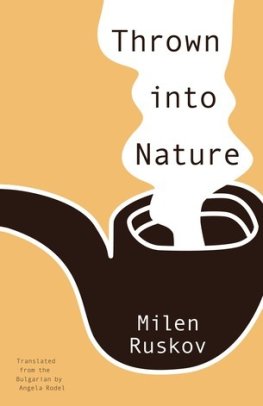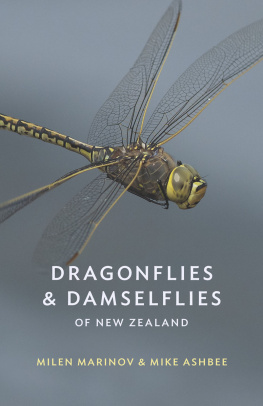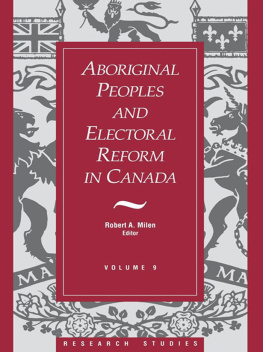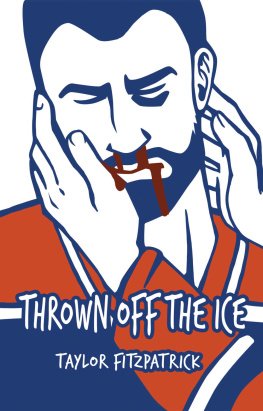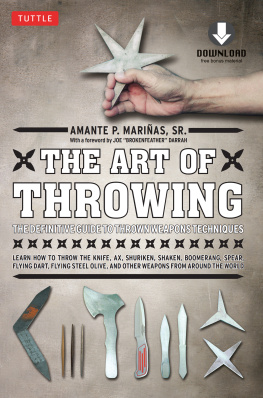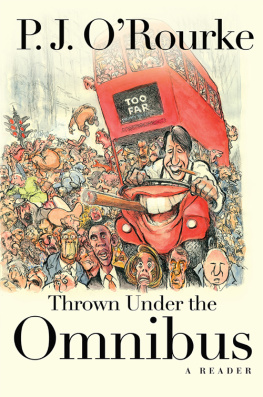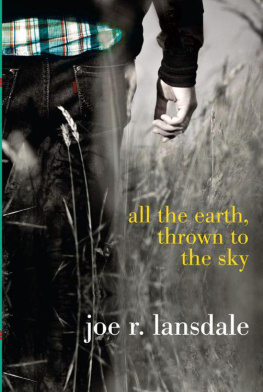Milen Ruskov - Thrown into Nature
Here you can read online Milen Ruskov - Thrown into Nature full text of the book (entire story) in english for free. Download pdf and epub, get meaning, cover and reviews about this ebook. year: 2011, publisher: Open Letter, genre: Prose. Description of the work, (preface) as well as reviews are available. Best literature library LitArk.com created for fans of good reading and offers a wide selection of genres:
Romance novel
Science fiction
Adventure
Detective
Science
History
Home and family
Prose
Art
Politics
Computer
Non-fiction
Religion
Business
Children
Humor
Choose a favorite category and find really read worthwhile books. Enjoy immersion in the world of imagination, feel the emotions of the characters or learn something new for yourself, make an fascinating discovery.
- Book:Thrown into Nature
- Author:
- Publisher:Open Letter
- Genre:
- Year:2011
- Rating:4 / 5
- Favourites:Add to favourites
- Your mark:
- 80
- 1
- 2
- 3
- 4
- 5
Thrown into Nature: summary, description and annotation
We offer to read an annotation, description, summary or preface (depends on what the author of the book "Thrown into Nature" wrote himself). If you haven't found the necessary information about the book — write in the comments, we will try to find it.
Thrown into Nature — read online for free the complete book (whole text) full work
Below is the text of the book, divided by pages. System saving the place of the last page read, allows you to conveniently read the book "Thrown into Nature" online for free, without having to search again every time where you left off. Put a bookmark, and you can go to the page where you finished reading at any time.
Font size:
Interval:
Bookmark:
Milen Ruskov
Thrown into Nature
Preface
There is hardly anything more natural than hating Nature. Yet people dont realize this due to their crazy ideas. For example, many think that this world is ruled by the Devil. As some of the ancients put it, the Devil saw the Kingdom of God and tried to make something similar. He is a sorry imitator, by their own admission. Yet not entirely inept, they add, and mighty cruel, too. But all of that is stuff and nonsense. Others reckon that the world is Gods doing. If this is so, then He is not who they think He is but just some moronic mad scientist. All that is stuff and nonsense, too. But if its not the one, nor the other, then what is it? you may ask. That is a stupid question. This is what: the world is simply mad Natures work. Which is precisely why it looks the way it does, since it is her work. She is absolutely mad, the incarnation of chaos, a game of blind chance. I feel a deep-seated hatred of Nature. Yes, I do! If there is something I deeply and truly hate, it is Nature. Is there anything more endlessly energetic, more lavishly fertile, yet crazier, than she? Of course not! If Nature put on a human face and strolled around the streets of Sevilla, she would have long since been locked up as a dangerous maniac, perhaps even burned at the stake by the Inquisition. She would be of the female sex, of course, giving birth to a child every five minutes, laughing and jumping about at the same time, and impregnated without a visible agent, as if by the wind itself. Yes, Nature is absolutely mad!
Yet she and she alone is the procreator of the world. Not the Devil or God, not some evil genius or some moronic mad scientist, much less the Good Lord, but simply a mad, all-powerful, all-purblind, accidental and chaotic Nature. As a member of the medical profession, it actually becomes me to hold such an opinion. Moreover, it shows that Ive found my true calling, since I sincerely and profoundly profess the above-stated opinions.
My name is Guimares da Silva. The da Silva part is made-up, by the way, since an aristocratic title causes people to pay more attention to what you say. And besides, Dr. Monardes wanted me to change my name so he could introduce me as his assistant without embarrassment. This is my assistant da Silva, Dr. Monardes now says, and it really does sound better that way. Sometimes he even presents me as Dr. da Silva. Of course, I am not yet a doctor although I hope to be some day but rather a mere helpmate and student of Dr. Monardes. Incidentally, he never mentions that I am Portuguese. The Portuguese are thought to smell bad, spread malaria (since they wade through the swamps around the city), and to constantly present themselves as noblemen who just happen to end up in Sevilla and who try to swindle everyone they can out of piddling sums. I, he says, am Joo da So-and-So, and I have come to buy a parcel of land in Peana at a good price or to build a ship in Cadiz. Then he starts playing the fool, so that youll swallow the act and decide to join the venture, usually for cheap or at a huge profit, at which point he disappears with the ducats. The curious thing here is that the notorious seductive power of money addles the mind of the one forking it over a relatively rare and interesting phenomenon that lies behind the prosperity of many a crook, for example, the owners of gambling houses for if he had preserved even a bit of his presence of mind, he would have asked himself why anyone would come to buy land or to build a ship in Spain, given that it is far cheaper to do so in Portugal. Yet clearly people cease thinking in such cases. For this reason, Sevilla is full of fake receipts from Portuguese shysters. Even Dr. Monardes has one.
At the inns, they now ask the Portuguese for their money upfront, since previously they would stop for the night, eat and drink their fill but never so much as to not be able to get up before the first cock crowed the next morning and sneak away without paying. Rumor has it that they would only pay some servant to wake them up early in the morning. Since most of the servants at the inns are also Portuguese, this made it all the cheaper for them. A Portuguese would kill a man for a ducat and himself for two. The only thing preventing him from doing the latter is the fear that you would swipe them afterwards. A real sly dog.
Of course, all these revolting characteristics do not pertain to me. I consider my fellow countrymen to be complete abominations and if I were in the habit of paying attention to abominations, I would be ashamed of them. But I do not pay attention to such things, nor, in recent days, to practically anything. The side effect of this, however, is that one suffers from insomnia. Yet such disinterestedness is also one of Dr. Monardes pieces of advice. Dont pay attention to anything except medicine, he says, and to a number of very simple and obvious everyday necessities, which are, in fact, so self-evident that you may easily carry them out without paying them any particular attention. You mustthe doctor insistsalways keep your mind focused on important things, and in the absence of such things, on nothing at all. Although in the latter case you ought to think long and hard about why and how you ever reached such a condition in the first place. Yes, Dr. Monardes is a person from whom one can learn much, not just about medicine, but about life in general. He understands the modern world and human nature like no other.
My Portuguese provenance, of course, can easily be discerned from my name. So how did I hit on precisely that name? When Dr. Monardes requested I add an aristocratic title, I recalled the village where I was born. The principle behind such appellations, as everyone knows, is to indicate where you come from. However, the village had a nondescript name. Yet by way of compensation it was ringed by magnificent forests. Thus, I decided to christen myself da Silva, after the Latin for forest. Dr. Monardes approved the name, and I like it as well it was a good choice.
Perhaps my reader might object that this does not fit in well with my hatred of Nature. First of all, I would like to state that it is in no sense obligatory for something to fit with anything else whatsoever, except for in the healing practices of medicine, but even then it is far from necessary in all cases and as one gradually comes to understand, sometimes it is impossible and even harmful. I know of many cases in which the most logical path to healing has turned out to be fatal. In my work with Dr. Monardes, I have been witness to cases in which the most illogical intuition turns out to be life-saving. Incidentally, Dr. Monardes is a person with exceptional intuition. The exercise of reason is something he places in strict boundaries and always keeps reigned in, like a horse trained under a heavy hand. Every disease can have at least three causes, Dr. Monardes says. Your knowledge helps you to distinguish them. One of them always pops into your mind first. And it is usually wrong.
I suspect that if this were not the case, every reasonably well-read person could become a medical man. So why do I want to become one? Above all because this profession is no worse than any other, and often more profitable, too. At the same time, it offers me the opportunity to confront Nature. People are the victims of Nature. Not that I have any love lost for people. People. . What can I say?. . The craziness of the universal procreator is reflected in them, they are her offspring. But the sick person is a victim of Nature. In her madness she has created within his body one endlessly complex and poorly regulated mechanism, always on the verge of breaking down, yet at the same time unpredictable, chaotic, and random he might collapse from the tiniest thing, yet he might also withstand the most monstrous experiences. Take, for example, the sailor, Francisco Rodrigues, one of the eighteen survivors from Magellans expedition (who was also Portuguese, by the way, which is surely one of the reasons he died in so absurd a fashion), who somehow endured a three-month fever in the middle of the Pacific Ocean, far from any source of succor, only to die from the prick of a rusty nail on the vessel
Font size:
Interval:
Bookmark:
Similar books «Thrown into Nature»
Look at similar books to Thrown into Nature. We have selected literature similar in name and meaning in the hope of providing readers with more options to find new, interesting, not yet read works.
Discussion, reviews of the book Thrown into Nature and just readers' own opinions. Leave your comments, write what you think about the work, its meaning or the main characters. Specify what exactly you liked and what you didn't like, and why you think so.

